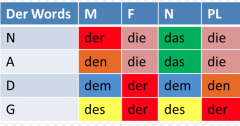![]()
![]()
![]()
Use LEFT and RIGHT arrow keys to navigate between flashcards;
Use UP and DOWN arrow keys to flip the card;
H to show hint;
A reads text to speech;
28 Cards in this Set
- Front
- Back
|
Dative Case |
The case of the indirect object, follows certain verbs and certain prepositions |
|
|
*Indirect objects determined by asking for whom or in reference to whom the action of the verb is taking place |
|
|
|
*Dative form of the interrogative pronoun is Wem? (to whom?) |
Nominative (persons): Wer? Nominative (things): Was? Accusative (persons): Wen? Accusative (things): Was? Dative (persons): Wem? |
|
|
Dative forms of definite and indefinite articles |
Masculine: Dem, Einem, Keinem Neutral: Dem, Einem, Keinem Feminine: Der, Einer, Keiner Plural: Den, Keinen *Possessive adjectives mein, dein, sein (his), and Ihr follow the pattern of ein and kein (Ihrem, meinem) |
|
|
*In the dative plural, all nouns add an -n ending, unless the plural form ends in -n or -s. |
Die Kinder becomes den Kindern, but die Eltern just becomes den Eltern |
|
|
N-nouns also have an -n or -en ending in dative singular as they do in the accusative singular. |
|
|
|
Direct objects = Accusative |
Indirect objects = Dative |
|
|
Dative prepositions |
aus außer bei mit nach seit von zu |
|
|
aus |
out of, from (a place of origin) |
|
|
außer |
besides |
|
|
bei |
at, for (a company) near, by at the home of, with (a person) |
|
|
mit |
with together with |
|
|
nach |
after (time) to (cities, countries, continents) to (in certain expressions) Ex: Gehen Sie nach Hause (home)! (on the way home) |
|
|
seit |
since for (duration) |
|
|
von |
of from by (creator, doer of action) |
|
|
zu |
to (in the direction of) at (in certain expressions) for (purpose) Ex: Sie sind nicht zu Hause (at home). (already at your house) |
|
|
Dative prepositions that are frequently contracted with the definite article |
bei + dem = beim von + dem = vom zu + dem = zum zu + der = zur |
|
|
*Direct objects generally follow... |
indirect objects |
|
|
Way to remember Case endings |

|
|
|
Way to remember dativ prepositions:
|
https://www.youtube.com/watch?v=bw1O_Z9Wo-8
|
|
|
Dative verbs |
Antworten Danken Gefallen Gehören Glauben Helfen Schmecken |
|
|
Antworten |
to answer |
|
|
Danken |
To thank |
|
|
Gefallen |
to please, to be pleasing to (not used with food but rather with cities, pictures, an item of clothing, or people who are pleasing to you) |
|
|
Gehören |
to belong to |
|
|
Glauben |
to believe |
|
|
Helfen |
to help |
|
|
Schmecken |
to taste (used with food and beverages) |

